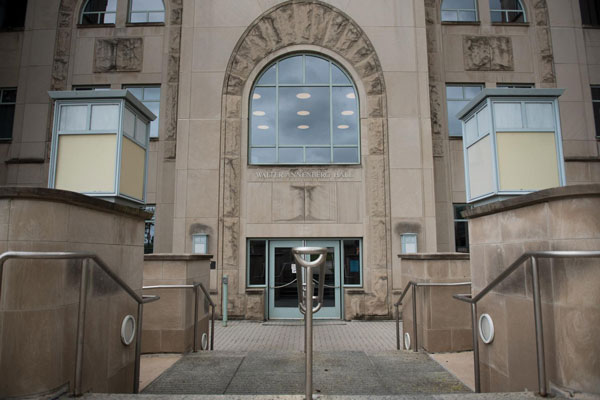SESP students face difficulties with practicums due to government shutdown

Daily file photo by Allie Goulding.
An image of SESP’s Annenberg Hall.
January 9, 2019
As the partial U.S. government shutdown continues, some School of Education and Social Policy students are facing difficulties completing their mandatory practicums.
These field work internships, which are required for SESP students, usually include positions at government agencies, but such options are no longer viable this quarter. Three students have been affected by the shutdown and have the choice to either move their practicum to another quarter or scramble to find another site. Such obstacles were unexpected, said practicum director Nathan Frideres.
“At first I was hoping that the shutdown would end, that it wouldn’t impact our students,” he said. “There’s been so much uncertainty with the situation.”
Since the shutdown, Frideres said he has been helping the affected students reach the “best course of action.”
Some government agencies are without funding as President Donald Trump refuses to sign a spending bill without money for a border “wall,” despite an earlier agreement between the U.S. House and Senate before the new year. Negotiations between the House, now under control of the Democrats, and Trump have stalled as both sides refuse to budge from their stance on the wall.
SESP junior Meg Pisarczyk, who was originally going to work at the Chicago office of the Equal Employment Opportunity Commission, decided to push her practicum to the spring. She chose to do so to avoid scrambling to find a new site, she said. While reapplying for new positions in the spring, she will be a part-time student on campus.
“I decided to switch my practicum to Spring Quarter which is kind of disappointing because I had planned my academic schedule around it, and I was excited to have a quarter off from classes,” she said. “But I guess you have to be flexible sometimes.”
The shutdown is particularly frustrating because the application process for practicums is intense, Pisarczyk said. Students have to find time for forms and interviews while juggling a strenuous academic workload.
Pisarczyk said she was not prepared for the government shutdown to have such personal impacts. Even when news of a possible shutdown loomed, she said she never made the connection to losing her internship opportunity until the last minute.
“It’s definitely frustrating to have to deal with the government shutdown on a personal level because it’s just really unexpected,” she said. “You wouldn’t really think it would impact something like your classwork or graduation requirements for Northwestern.”
The shutdown is also impacting SESP students who are applying for practicums in Washington D.C. in the summer. Though they have to be accepted by a Capitol Hill internship by the end of the quarter, students have yet to access applications that were supposed to be released Jan. 1.
SESP junior Marissa Uri said she is concerned that this will delay the approval process of applications. If the government does not reopen in time, she said she may have to choose a non-government-related organization.
“One of the reasons I chose D.C. was to understand more of the government aspect of policy so … it’s definitely concerning that I wouldn’t be able to work in governmental positions if this continues,” she said.
Though SESP has yet to contact students who are planning to have their practicum in D.C., Uri said she is confident they will reach out if the shutdown is prolonged.
Despite the sudden change in plans, Pisarczyk said she has taken this experience as a learning opportunity.
“It’s a good lesson in learning how to be flexible and just kind of going with the flow, which is not something I’m normally good at,” she said.
Email: [email protected]
Twitter: @ck_525











